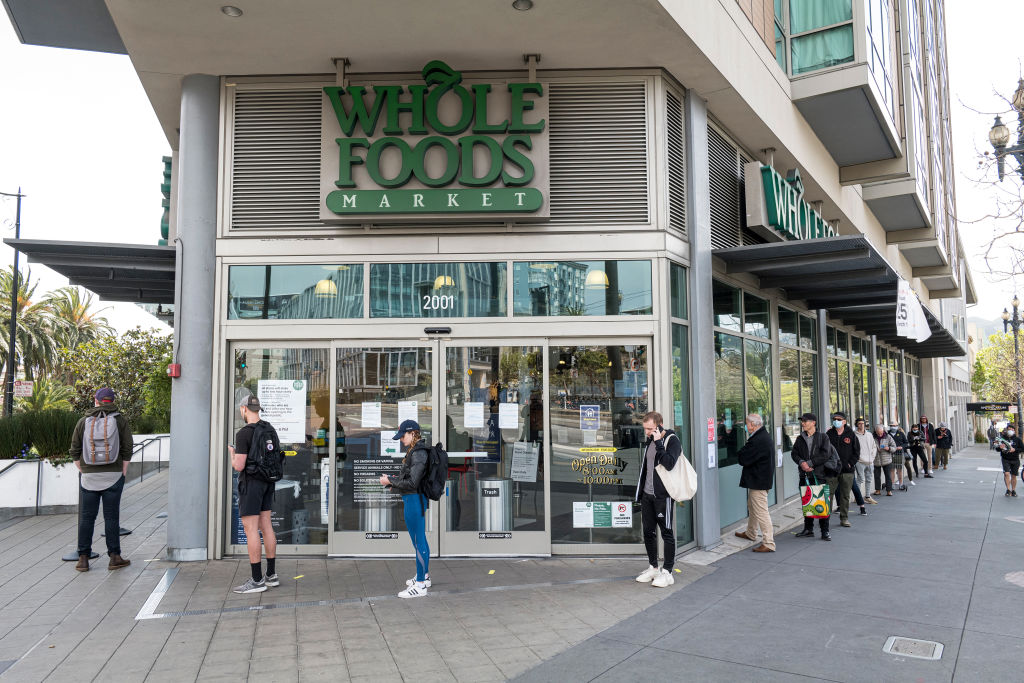
A nearly 65,000-square foot Whole Foods in the city’s downtown Mid-Market neighborhood shut its doors abruptly on Monday to “ensure the safety” of its employees, a Whole Foods spokesperson said. A City Hall source told The San Francisco Standard the company cited deteriorating street conditions around drug use and crime near the grocery store as a reason for its closure.
The location opened just last year, and was one of the largest grocery stores in downtown San Francisco, heralded as a “flagship store” for the chain.
The closure is just the latest development in the city’s downtown struggles to rebound from the pandemic.
‘Maybe We Cried Too Much’
Some have argued that retail closures have less to do with theft and more with a lack of foot traffic decimating local businesses. The streets of San Francisco’s downtown were long filled with a mix of tourists and office workers—but that all changed during the pandemic when the Bay Area saw a nearly five-fold increase in remote workers. Businesses throughout downtown San Francisco have closed, and the city’s economic recovery ranks 24th out of 25 large U.S. cities, beating out only Baltimore.
More from TIME
Walgreens closed five of its San Francisco locations in 2021, citing theft as the reason for closure. A Walgreens executive later admitted that the claims might have been overstated. “Maybe we cried too much last year,” Walgreens finance chief James Kehoe said in an earnings call earlier this year.
A Neighborhood ‘Neglected’
San Francisco, where an income of $100k is considered “low-income,” is one of the most expensive cities in America. It also faces a twin crisis of homelessness and drug use, with drug overdoses making up the leading cause of death among people experiencing homelessness.
According to the San Francisco Chronicle, the city’s Point-in-Time data, which aims to document the number of unhoused individuals across the city, revealed that a three-block area in the Tenderloin district—a five-minute walk from the shuttered Whole Foods—had more than 400 more unhoused people in 2022 compared to 2019, despite homelessness being down in San Francisco overall.
The neighborhood has historically been neglected, Randy Shaw, Executive Director at Tenderloin Housing Clinic, told WBUR. “We have district elections, so most of the supervisors don’t represent the Tenderloin. So politically, it’s easier for them to not have to deal with it and just feel like it’s someone else’s problem.”
Shaw said that’s a big part of why little has been done to solve the drug crisis in the Tenderloin. “Historically, there’s always been people who felt like, well, let it happen in the Tenderloin so it doesn’t happen in … the other upscale neighborhoods.”
The pandemic only exacerbated the issue, with illegal open-air drug use becoming more visible as downtown emptied of people. The city began to see far more overdoses too. San Francisco saw 92 drug deaths in 2015, compared to over 700 in 2020, many of which were fentanyl-related. And figures released by the San Francisco Police Department show that the city saw a 23% increase in property crimes between 2020 and 2022, with spikes in burglary and theft.
In a March 27 letter, Mayor Breed asked for help to curb San Francisco’s open air drug markets. Breed said that the city faces “multiple serious public safety challenges locally.” She added that the city’s biggest concern was drug dealing, describing dealers as becoming increasingly aggressive with police, city workers and residents, and violence around “brazen open-air drug dealing scenes.”
Avoiding a ‘Doom Loop’
As workers remain remote and businesses struggle, some speculate that the changes could spell out disaster for the city, with reports warning of a “doom loop” in which cascading negative economic events compound. Others are more optimistic, proposing radical changes–like converting old office buildings into student housing—to revitalize the neighborhood.
Meanwhile, some politicians are using theWhole Foods closure to call for more policing in the city, whose department has massive drops in staffing.
Matt Dorsey, a member of San Francisco’s Board of Supervisors, tweeted, “San Franciscans — or at least the ones I represent in District 6 — are demanding solutions, and they have a right to expect that from those of us in City Hall. I hope my colleagues will support this effort. We owe our residents nothing less.”
More Must-Reads From TIME
- The 100 Most Influential People of 2024
- The Revolution of Yulia Navalnaya
- 6 Compliments That Land Every Time
- What's the Deal With the Bitcoin Halving?
- If You're Dating Right Now , You're Brave: Column
- The AI That Could Heal a Divided Internet
- Fallout Is a Brilliant Model for the Future of Video Game Adaptations
- Want Weekly Recs on What to Watch, Read, and More? Sign Up for Worth Your Time
Write to Simmone Shah at simmone.shah@time.com